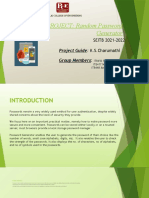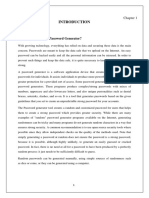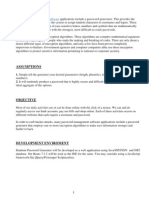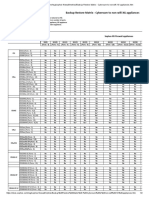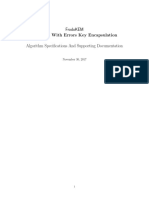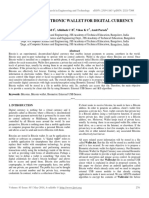Python
Uploaded by
gunanaik81Python
Uploaded by
gunanaik81Intel College Excellence Program
Project Synopsis
Random Password Generator
Team member’s detail
S. No Participant Name Mobile No. Email ID
1
2
Faculty(college) mentor detail
S. No Mentor Name Mobile No. Email ID
1.
College/University Name
Lovely Professional University
Project Proposal Page 1 of
BACKGROUND
A random password generator is a software tool that creates a strong and unique password for users
to use in various online services. These passwords are often a combination of uppercase and
lowercase letters, numbers, and special characters.
The use of strong passwords is essential for online security, as they make it harder for
hackers to gain access to user accounts. Many online services now require users to create complex
passwords, and some even enforce rules such as password length and the use of special characters.
Random password generators can be built into password managers, web browsers, and
other applications, or they can be standalone tools that users can download and use. They typically
generate passwords using algorithms that are designed to create unpredictable and difficult-to-
guess passwords.
While random password generators can be a useful tool for improving online security, it is
important to note that they are not foolproof. Users should still take additional measures, such as
enabling two-factor authentication and avoiding using the same password across multiple accounts,
to further improve their online security.
PROBLEM IDENTIFICATION
The random password generator project aims to solve is the issue of weak and easily guessable
passwords. Many users tend to create passwords that are easy to remember, such as their birthdate,
name, or a common word, which makes their accounts vulnerable to hackers. In addition, many
users tend to reuse the same password across multiple accounts, which further increases the risk of
their accounts being compromised.
Random password generators aim to solve this problem by creating strong and unique
passwords that are difficult for hackers to guess or crack. By using a combination of letters, numbers,
and special characters, these passwords can be much harder to crack than simple passwords created
by users. In addition, random password generators can help prevent users from reusing the same
password across multiple accounts, which reduces the risk of multiple accounts being compromised
in the event of a security breach.
PROPOSED SOLUTION
The proposed solution for the random password generator project is to develop a software
tool that generates strong and unique passwords for users. This tool should be designed to be easy
to use, so that users can quickly generate new passwords whenever they need to create a new
account or update their existing passwords.
The random password generator should use a secure algorithm to generate passwords that
are difficult to guess or crack. This algorithm should consider factors such as password length,
character complexity, and the use of random characters to ensure that the passwords generated are
as secure as possible.
To make the tool more user-friendly, the random password generator can be integrated into
other applications, such as web browsers or password managers, or it can be made available as a
standalone tool that users can download and use. Additionally, the tool can offer options for
customizing the password generation process, such as allowing users to specify the length of the
password or the types of characters to include.
Project Proposal Page 2 of
Overall, the proposed solution for the random password generator project is to develop a
secure and user-friendly tool that helps users create strong and unique passwords to improve their
online security.
HARDWARE & SOFWARE REQUIREMENTS
Hardware requirements:
- The hardware requirements for a random password generator are typically minimal, as the
application does not require significant processing power or memory.
- A computer or mobile device with internet access is sufficient for most implementations.
Software requirements:
- The random password generator application can be developed using a variety of programming
languages, depending on the preferences and expertise of the development team.
- For web-based implementations, the application can be developed using JavaScript, with a server-
side scripting language Python for generating the passwords.
- For desktop applications, the application can be developed using the programming language
Python.
BLOCK DIAGRAM & DESCRIPTION
Project Proposal Page 3 of
FUTURE SCOPE
1. Integration with password managers: Password managers have become increasingly popular in
recent years, as they allow users to store and manage their passwords securely. Random password
generators can be integrated with password managers to make it easier for users to generate strong
and unique passwords.
2. Improved password strength metrics: Current password strength metrics often focus on factors
such as password length and complexity, but there is room for improvement in this area. Future
password generators could consider additional factors such as entropy, dictionary attacks, and brute
force attacks to generate even more secure passwords.
3. Biometric authentication: Biometric authentication, such as fingerprint or facial recognition, is
becoming increasingly common in modern devices. Future password generators could incorporate
biometric authentication as an additional layer of security, making it even more difficult for
unauthorized users to access user accounts.
4. Integration with multi-factor authentication: multi-factor authentication (MFA) is an increasingly
popular security feature that requires users to provide multiple forms of authentication before
accessing an account. Future password generators could integrate with MFA systems to provide
even greater security for user accounts.
5. Machine learning-based password generation: Machine learning algorithms can be trained to
generate passwords based on patterns in user behavior and other factors. Future password
generators could use machine learning techniques to generate even more secure and personalized
passwords for users.
CONCLUSION
A random password generator project offers a solution to the problem of weak and
easily guessable passwords. By using a secure algorithm to generate strong and unique
passwords, users can improve their online security and reduce the risk of their accounts being
compromised.
The project can be implemented using a variety of hardware and software, depending
on the specific requirements and target platform. Integration with password managers,
improved password strength metrics, biometric authentication, integration with multi-factor
authentication, and machine learning-based password generation are some potential areas for
future development and improvement.
Overall, a random password generator is a valuable tool that can help users improve
their online security, and the future scope for such a project is promising as technology
continues to advance and security threats continue to evolve.
REFERENCES
Project Proposal Page 4 of
You might also like
- Palo Alto Networks Security Best Practices ChecklistNo ratings yetPalo Alto Networks Security Best Practices Checklist12 pages
- Mini Project (Ramdom Password Gernator)No ratings yetMini Project (Ramdom Password Gernator)28 pages
- Random Password Generator: A Project Report ON50% (2)Random Password Generator: A Project Report ON12 pages
- Vidyavardhini Charitable Trust Abhaysinhraje Bhonsle Institute of Technology Shahunagar Shendre, SataraNo ratings yetVidyavardhini Charitable Trust Abhaysinhraje Bhonsle Institute of Technology Shahunagar Shendre, Satara12 pages
- JavaScript Programming: 3 In 1 Security Design, Expressions And Web DevelopmentFrom EverandJavaScript Programming: 3 In 1 Security Design, Expressions And Web DevelopmentNo ratings yet
- CODING FOR ABSOLUTE BEGINNERS: How to Keep Your Data Safe from Hackers by Mastering the Basic Functions of Python, Java, and C++ (2022 Guide for Newbies)From EverandCODING FOR ABSOLUTE BEGINNERS: How to Keep Your Data Safe from Hackers by Mastering the Basic Functions of Python, Java, and C++ (2022 Guide for Newbies)No ratings yet
- Basics of Programming: A Comprehensive Guide for Beginners: Essential Coputer Skills, #1From EverandBasics of Programming: A Comprehensive Guide for Beginners: Essential Coputer Skills, #1No ratings yet
- It's Signed Therefore It's Clean - Jarno NiemeläNo ratings yetIt's Signed Therefore It's Clean - Jarno Niemelä30 pages
- Session: A Model For End-To-End Encrypted Conversations With Minimal Metadata LeakageNo ratings yetSession: A Model For End-To-End Encrypted Conversations With Minimal Metadata Leakage32 pages
- Backup Restore Matrix - Cyberoam To Non-Wifi XG AppliancesNo ratings yetBackup Restore Matrix - Cyberoam To Non-Wifi XG Appliances2 pages
- Module - 2 - CS701 - Information Security - Dr. M.selvamNo ratings yetModule - 2 - CS701 - Information Security - Dr. M.selvam30 pages
- The DES Algorithm Illustrated: by J. Orlin GrabbeNo ratings yetThe DES Algorithm Illustrated: by J. Orlin Grabbe13 pages
- 4300A Handbook Attachment Q4 Sensitive RFID Systems 2014No ratings yet4300A Handbook Attachment Q4 Sensitive RFID Systems 201424 pages
- BlackHorse SIGREDUX PowerPoint PresentationNo ratings yetBlackHorse SIGREDUX PowerPoint Presentation2 pages
- Information Security: Principles and Practices, 2 EditionNo ratings yetInformation Security: Principles and Practices, 2 Edition37 pages
- Presentation State of Cyber Security in MyanmarNo ratings yetPresentation State of Cyber Security in Myanmar36 pages






